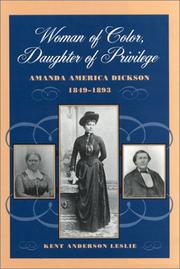Check nearby libraries
Buy this book

Woman of Color, Daughter of Privilege is the life story of an elite woman of color who lived within the social and economic systems of slavery and quasi-freedom in nineteenth-century Georgia.
Antebellum Hancock County, Georgia, was a place where black slaves outnumbered white citizens by almost two to one; a place where education, culture, and even luxury were available to a small minority of the ruling race; a place where people often knew each other all their lives. It was also a place that permitted an elite, white male to father the child of a slave, raise the child as his own, and leave her the bulk of his estate.
Born in 1849, Amanda America Dickson was taken from her mother after she was weaned to live with her father, David Dickson, and her grandmother, Elizabeth Dickson. Legally a slave until 1864, Amanda America was able to elude this status by wrapping herself in the cloak of her father's wealth and prestige. Although her mother continued to live and work in the Dickson household, Amanda America defined herself as a "no nation" among both her black relatives and white relatives.
It was not until her father's death in 1885 that her independent social status as an elite mulatto lady was established.
When the contents of David Dickson's will were revealed, the silence that had separated his private life from his public life was shattered. David Dickson made his mulatto daughter the largest property owner in the county. Amanda America Dickson's lawyers defended the will all the way to the Georgia Supreme Court, where the ruling of the lower court to honor David Dickson's will was upheld.
After the trial, Amanda Dickson moved to Augusta, Georgia, where she bought a house in the most fashionable section of the city, married Nathan Toomer, the father of the African-American writer, Jean Toomer, and lived out her days there comfortably amid the notoriety of being David Dickson's illegitimate mulatto daughter and the wealthiest black woman in the South.
As the acknowledged daughter of the Hancock County planter, Amanda America's presence confounded the boundary between the patriarchal family unit and the "extended family" of slavery. Kent Anderson Leslie uses her story to reveal such racial ambiguities, which existed both before and after the Civil War, under slavery and emancipation.
Examining closely the interlocking issues of race, class, and gender, Leslie explores both the black and white communities in order to determine what factors made it possible for them to tolerate an exception to the rule.
Check nearby libraries
Buy this book

Previews available in: English
Subjects
Biography, Racially mixed people, Plantation life, HistoryPlaces
Georgia, Hancock County, Hancock County (Ga.)Times
19th centuryShowing 2 featured editions. View all 2 editions?
| Edition | Availability |
|---|---|
|
1
Woman of Color, Daughter of Privilege: Amanda America Dickson, 1849-1893
2010, University of Georgia Press
in English
082033717X 9780820337173
|
zzzz
Libraries near you:
WorldCat
|
|
2
Woman of color, daughter of privilege: Amanda America Dickson, 1849-1893
1995, University of Georgia Press
in English
0820316881 9780820316888
|
aaaa
Libraries near you:
WorldCat
|
Book Details
Edition Notes
Includes bibliographical references (p. [179]-211) and index.
Classifications
The Physical Object
ID Numbers
Source records
Internet Archive item recordmarc_openlibraries_sanfranciscopubliclibrary MARC record
Internet Archive item record
Library of Congress MARC record
marc_columbia MARC record
Work Description
This fascinating story of Amanda America Dickson, born the privileged daughter of a white planter and an unconsenting slave in antebellum Georgia, shows how strong-willed individuals defied racial strictures for the sake of family. Kent Anderson Leslie uses the events of Dickson's life to explore the forces driving southern race and gender relations from the days of King Cotton through the Civil War, Reconstruction, and New South eras.
Although legally a slave herself well into her adolescence, Dickson was much favored by her father and lived comfortably in his house, receiving a genteel upbringing and education. After her father died in 1885 Dickson inherited most of his half-million dollar estate, sparking off two years of legal battles with white relatives. When the Georgia Supreme Court upheld the will, Dickson became the largest landowner in Hancock County, Georgia, and the wealthiest black woman in the post-Civil War South.
Kent Anderson Leslie's portrayal of Dickson is enhanced by a wealth of details about plantation life; the elaborate codes of behavior for men and women, blacks and whites in the South; and the equally complicated circumstances under which racial transgressions were sometimes ignored, tolerated, or even accepted.
Community Reviews (0)
Feedback?History
- Created April 1, 2008
- 11 revisions
Wikipedia citation
×CloseCopy and paste this code into your Wikipedia page. Need help?
| July 16, 2024 | Edited by MARC Bot | import existing book |
| November 18, 2020 | Edited by MARC Bot | import existing book |
| March 15, 2020 | Edited by ImportBot | import existing book |
| May 19, 2019 | Edited by MARC Bot | import existing book |
| April 1, 2008 | Created by an anonymous user | Imported from Scriblio MARC record |















